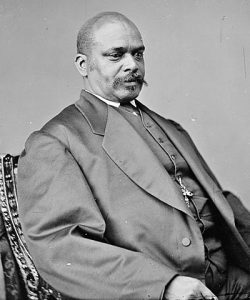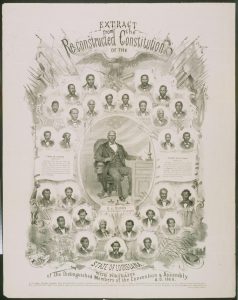Oscar James Dunn was the nation's first African-American lieutenant governor. He served in Louisiana from 1865–1871. He was a significant political figure during Reconstruction in Louisiana, but after his death in 1871 he faded into obscurity.
Dunn was born a slave in New Orleans in 1822. In 1831 his mother married a free man of color named James Dunn who bought her and her two children's freedom. Dunn went on to become a plasterer and a leader in Louisiana's black Masonic lodges, which were very influential in Reconstruction politics. Known for his honesty, Dunn was a scholar of the law and worked to ensure fair wages for freed men. He was appointed to the city council of New Orleans and pushed for universal suffrage for black men (which was obtained with the ratification of the Fifteenth Amendment on February 31, 1870).
In January 1868 Republicans met to elect Louisiana gubernatorial candidates. Dunn was nominated for the post of lieutenant governor by P. B. S. Pinchback and ran on the ticket with Henry C. Warmoth, but Dunn feared Warmoth would only use him to secure favor among black voters and then expect him to fall in line.
During his time as lieutenant governor, Dunn presided over the Louisiana State Legislature's civil rights bills and the ratification of the 14th Amendment, which granted citizenship to anyone born or naturalized in the United States, including former slaves. Warmoth betrayed Dunn and vetoed a civil rights bill that would have offered protections for black Americans. This led to increasing division and political rivalries in the Republican Party and discussions arose about impeaching Warmoth.
Shortly after a public dinner in 1871, Dunn became ill. He died several days later, and though the official cause of death was "congestion to the brain and lungs," several doctors believed his death was the result of arsenic poisoning. Later that year, $10,000 was appropriated by Louisiana State Legislature Act 57 to erect a monument to Dunn. However, the monument was never erected, and his role in Louisiana politics has largely been forgotten.
To learn more about Dunn, listen to this great episode of the TriPod: New Orleans at 300 podcast from WWNO (while you are there don't forget to check out some of the other fantastic micro-documentaries exploring neglected, forgotten, or surprising stories from the city's past). To learn about New Orleans and Reconstruction politics check out New Orleans After the Civil War.
To learn more about New Orleans history and the tricentennial take a look at the titles and websites below.
A collection of outstanding nonfiction titles about the history of New Orleans. Also included are a collection of websites dedicated to the tricentennial.





Add a comment to: Celebrating the Tricentennial: Oscar James Dunn, America’s First Black Lieutenant Govenor